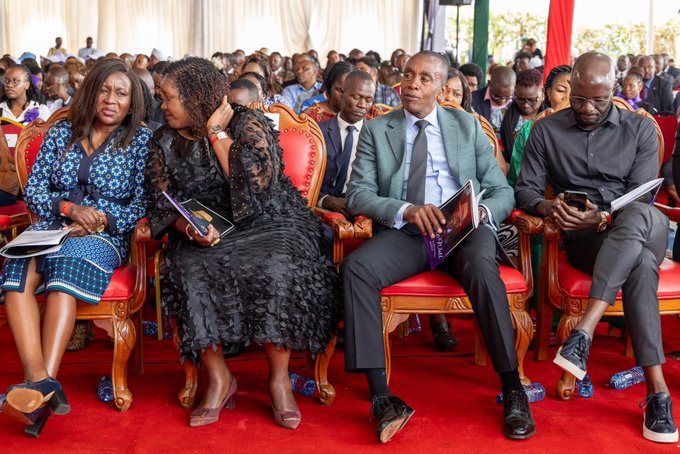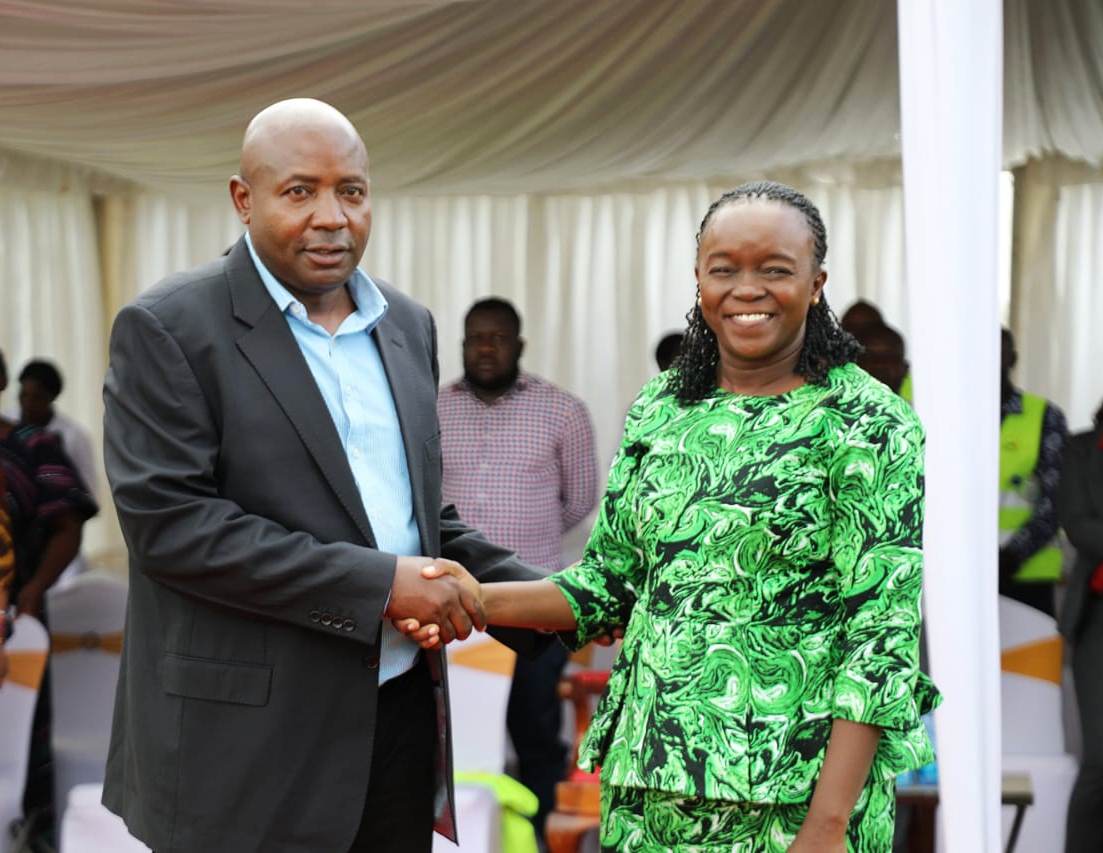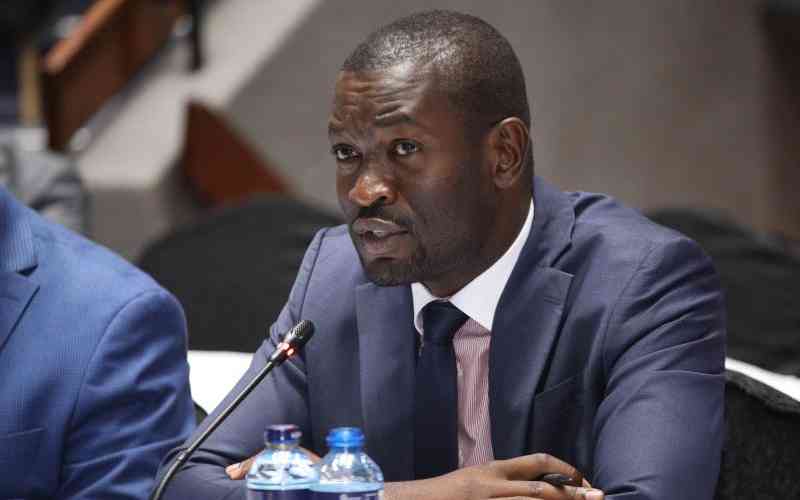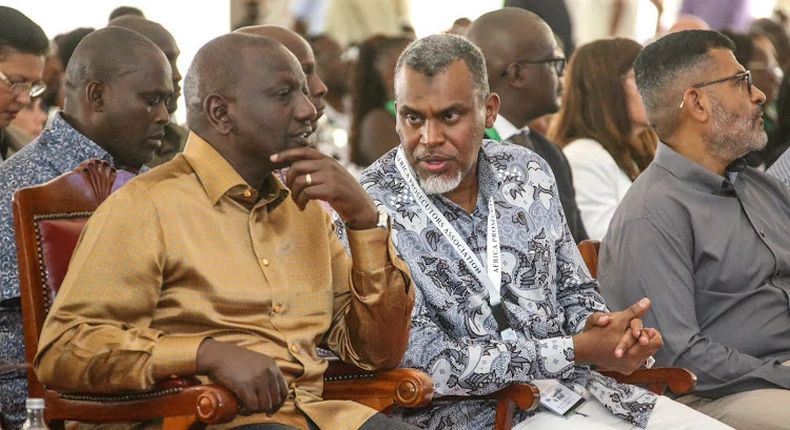By TWV Team
The simmering political schisms in Kiambu County were laid bare on Monday during the burial of the father of National Assembly Majority Leader Kimani Ichung’wah. The ceremony, attended by President William Ruto, exposed the isolation of Governor Kimani Wamatangi, who was not only denied a chance to address mourners but also seated 16 places away from the Head of State.
To unlock the full article:
Choose one of the options below:
- Ksh 10 – This article only
- Ksh 300 – Monthly subscription
- Ksh 2340 – Yearly subscription (10% off)
Wamatangi has increasingly found himself at odds with political leaders from the county, including MPs he accuses of being used by powerful forces to undermine him. His allies insist that his recent troubles with the Ethics and Anti-Corruption Commission (EACC), which is probing alleged corruption in his administration, are politically instigated.
The governor’s cold reception at the burial was underscored when Embu Governor Cecily Mbarire introduced her fellow governors, Johnson Sakaja of Nairobi and Susan Kihika of Nakuru, but only mentioned Wamatangi in passing. The move is expected to further heighten political temperatures in Kiambu, barely two years before the next General Election.
The development contrasted sharply with 10th August, when Wamatangi warmly welcomed President Ruto at PCEA Joshua Matenjwa Church in Limuru. On that occasion, the governor posted a photo on social media showing him cordially shaking hands with the President.
However, late last month, Wamatangi conspicuously skipped a meeting at State House, Nairobi, where leaders and opinion-shapers from Kiambu engaged the President. During that meeting, Ruto enumerated development projects undertaken in the county, including modern markets and housing schemes.
“Through bold, deliberate, and resolute decisions, we are delivering the largest market development programme in Kenya’s history, including 30 modern markets in Kiambu County alone at a cost of Ksh4.5 billion. In addition, we are building 15,000 housing units in the county at a total of Ksh30 billion,” President Ruto said.
He further outlined major infrastructure projects in the pipeline: “A new 10,000-seater stadium will be built in Thika town. We will also complete the 240km Mau Mau roads in the Kiambu section, and dual the Muthaiga–Ndumberi road at Ksh22 billion alongside the Northern Bypass for which we have allocated Ksh20 billion.”
Governor Wamatangi, who has been grappling with health workers’ strikes, has also openly criticised the government’s flagship Social Health Authority (SHA) reforms, which President Ruto continues to defend.
With more than 1.6 million registered voters, a figure expected to rise after fresh registration by the Independent Electoral and Boundaries Commission (IEBC), Kiambu remains central to Ruto’s re-election bid. Much of Mt Kenya is projected to rally behind Democracy for Citizens Party (DCP) leader Rigathi Gachagua, making Kiambu a critical battleground.
Ichung’wah recently courted controversy by suggesting that Kiambu should be carved out as a separate region, an idea that further reflects the county’s shifting political dynamics.
Former Gatundu South MP Moses Kuria, once thought to be gravitating towards former President Uhuru Kenyatta’s Jubilee Party after quitting as Ruto’s senior economic advisor, now appears to be part of a broader scheme to checkmate Gachagua’s influence. His Chama Cha Mashinani (CCM) party, which was part of the Kenya Kwanza Coalition, has since fielded a candidate in the Mbeere North by-election, signalling readiness to exploit fractures both in government and the Opposition.
Candidate Duncan Mbui, who defected from Gachagua’s DCP after falling out over zoning agreements, accused the former Deputy President of betrayal despite his efforts and financial investment in building the party’s grassroots presence.
Speculation is also rife that Kuria, who served as a Cabinet Secretary in Ruto’s administration, could himself run for governor.
While Wamatangi is ranked among the better-performing governors, Kiambu’s political landscape remains unpredictable, having seen three governors come and go since 2013. Already, Thika MP Alice Ng’ang’a has declared her intention to challenge him. She enjoys the backing of at least six MPs who argue that a woman should lead the county, pointing to the strong performance of female governors elsewhere.
“In 2013 we had William Kabogo, followed by Ferdinand Waititu in 2017 before his impeachment, which paved the way for Dr James Nyoro. Now we have Kimani Wamatangi. Unfortunately, all of these men as governors have failed the electorate. It’s time now to try our luck with a woman,” Ichung’wah said at a function in April last year.
As alliances shift and rivals position themselves for the county’s top seat, Kiambu’s politics promise to remain as volatile and unpredictable as ever.
[/full]




